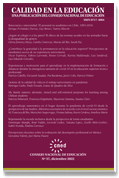Rethinking the Inclusive Education from Student Perspectives
DOI:
https://doi.org/10.31619/caledu.n57.1191Keywords:
inclusive education, school participation, participatory methodologiesAbstract
The implementation of an inclusive education requires the participation of all members of a school community, especially students. However, there is still an adult-centric and productivist view of students affecting their position as a social actor within the school. The aim of this study is to understand the type of school that students -attending schools with an inclusive orientation- value and project. From a qualitative design, focus groups based on a participatory methodology were carried out with 70 elementary and middle school students from seven schools with inclusive education projects. The main results indicate that the students dream of a flexible school linked to the territory where they live, with extended classrooms, comprehensive learning experiences and with a predominant role for themselves in the decision-making process. It is concluded that they value flexibility as a necessity to develop an open, inclusive and situated education.
Downloads
Published
Issue
Section
License
Authors retain their Copyright and only transfer a part of these to the journal, accepting the following conditions:
Authors keep their rights as authors and guarantee the right to the journal for the first publication of their work, which is simultaneously subject to the Creative Commons Attribution license allowing third parties to share the study accrediting the author and first publication in this journal.
Authors may adopt other non-exclusive license agreements for distribution of the version of the published work (e.g. inclusion in an institutional thematic file or publication in a monographic volume) accrediting initial publication in this journal.
Authors are allowed and recommended to share their work over the Internet (e.g. in institutional telematic files or their website) before and during the submission process, which may lead to interesting exchanges and increased citation of the published work. (See The effect of open access).

